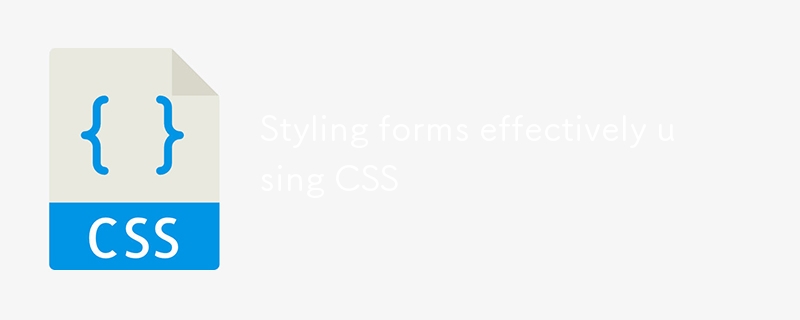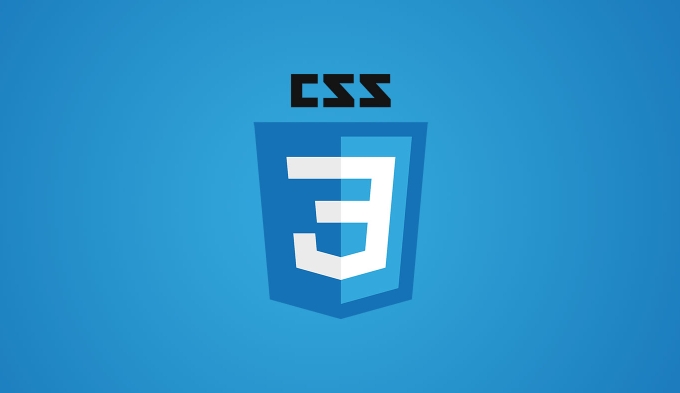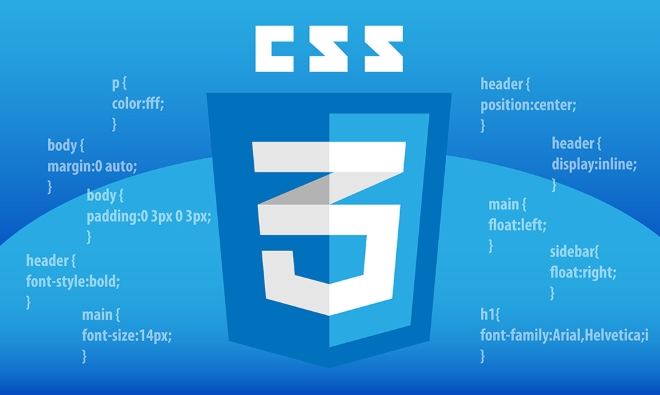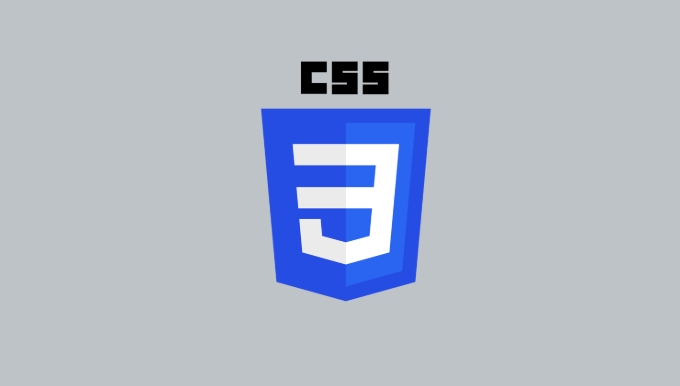Style the form through CSS to improve user experience and unify the page style. The specific methods are as follows: 1. Use universal reset styles to unify the appearance of form elements, and use flex or grid layout to optimize the structure to make the form items clearly arranged; 2. Use pseudo-classes such as: focus, :hover, :invalid and :valid to enhance state feedback and improve interactive intuitiveness; 3. Use native controls to hide native controls and simulate custom controls (such as check boxes) to improve visual consistency and better match the overall design style.

Forms are an important part of web interaction, but the default browser styles tend to appear monotonous and unattractive. Style the form through CSS, which not only improves the user experience, but also makes the overall style of the page more unified. The key is to master structure, state and detail control.

1. Basic style reset and layout optimization
The styles of form elements that come with the browser are quite different. It is recommended to use a general reset style to unify the appearance:

input, select, textarea {
border: 1px solid #ccc;
border-radius: 4px;
padding: 8px;
font-size: 16px;
outline: none;
}At the same time, a reasonable layout can improve readability and usability. You can use flex or grid to align labels and input boxes, such as:
.form-group {
display: flex;
flex-direction: column;
margin-bottom: 16px;
}
.form-group label {
margin-bottom: 8px;
}This allows each form item to be arranged clearly, making it easier for users to read and operate.

2. Status feedback enhances interactive experience
A good form should clearly reflect the user's operation status. You can set styles in different states through pseudo-class selector:
-
:focus: Highlight the field currently being entered -
:hover: Provide hover feedback -
:invalidand:valid: Show verification status
For example:
input:focus {
border-color: #007BFF;
box-shadow: 0 0 0 2px rgba(0,123,255,0.25);
}
input:invalid {
border-color: red;
}These small details make it easier for users to understand the current operation stage and also improve the intuitiveness of error prompts.
3. Custom controls improve visual consistency
Some native controls (such as <select> and <input type="checkbox"> ) perform inconsistently under different systems, and directly customizing them can improve visual unity. A common method is to hide native controls and emulate their functions with HTML CSS.
Take the check box as an example:
<label class="custom-checkbox"> <input type="checkbox" /> <span class="checkmark"></span> Agree to terms</label>
Cooperate with CSS:
.custom-checkbox input {
display: none;
}
.checkmark {
width: 16px;
height: 16px;
border: 1px solid #999;
border-radius: 3px;
display: inline-block;
position: relative;
}
input:checked ~ .checkmark {
background-color: #007BFF;
border-color: #007BFF;
}This method gives you complete control over the appearance of the controls and better match the overall design style of the website.
Basically that's it. The form style design seems simple, but to take into account compatibility, usability and aesthetics, you still need to spend more time on details.
The above is the detailed content of Styling forms effectively using CSS. For more information, please follow other related articles on the PHP Chinese website!

Hot AI Tools

Undress AI Tool
Undress images for free

Undresser.AI Undress
AI-powered app for creating realistic nude photos

AI Clothes Remover
Online AI tool for removing clothes from photos.

Clothoff.io
AI clothes remover

Video Face Swap
Swap faces in any video effortlessly with our completely free AI face swap tool!

Hot Article

Hot Tools

Notepad++7.3.1
Easy-to-use and free code editor

SublimeText3 Chinese version
Chinese version, very easy to use

Zend Studio 13.0.1
Powerful PHP integrated development environment

Dreamweaver CS6
Visual web development tools

SublimeText3 Mac version
God-level code editing software (SublimeText3)

Hot Topics
 How can I include CSS only on some pages?
Jun 11, 2025 am 12:01 AM
How can I include CSS only on some pages?
Jun 11, 2025 am 12:01 AM
There are three ways to selectively include CSS on a specific page: 1. Inline CSS, suitable for pages that are not frequently accessed or require unique styles; 2. Load external CSS files using JavaScript conditions, suitable for situations where flexibility is required; 3. Containment on the server side, suitable for scenarios using server-side languages. This approach can optimize website performance and maintainability, but requires balance of modularity and performance.
 Flexbox vs Grid: Understanding the Key Differences in CSS Layout
Jun 10, 2025 am 12:03 AM
Flexbox vs Grid: Understanding the Key Differences in CSS Layout
Jun 10, 2025 am 12:03 AM
Flexboxisidealforone-dimensionallayouts,whileGridsuitstwo-dimensional,complexlayouts.UseFlexboxforaligningitemsinasingleaxisandGridforprecisecontroloverrowsandcolumnsinintricatedesigns.
 Creating an Auto-Closing Notification With an HTML Popover
Jun 10, 2025 am 09:45 AM
Creating an Auto-Closing Notification With an HTML Popover
Jun 10, 2025 am 09:45 AM
The HTML popover attribute transforms elements into top-layer elements that can be opened and closed with a button or JavaScript. Popovers can be dismissed a number of ways, but there is no option to auto-close them. Preethi has a technique you can u
 What is 'render-blocking CSS'?
Jun 24, 2025 am 12:42 AM
What is 'render-blocking CSS'?
Jun 24, 2025 am 12:42 AM
CSS blocks page rendering because browsers view inline and external CSS as key resources by default, especially with imported stylesheets, header large amounts of inline CSS, and unoptimized media query styles. 1. Extract critical CSS and embed it into HTML; 2. Delay loading non-critical CSS through JavaScript; 3. Use media attributes to optimize loading such as print styles; 4. Compress and merge CSS to reduce requests. It is recommended to use tools to extract key CSS, combine rel="preload" asynchronous loading, and use media delayed loading reasonably to avoid excessive splitting and complex script control.
 How to use Lotties in Figma
Jun 14, 2025 am 10:17 AM
How to use Lotties in Figma
Jun 14, 2025 am 10:17 AM
In the following tutorial, I will show you how to create Lottie animations in Figma. We'll use two colorful designs to exmplify how you can animate in Figma, and then I'll show you how to go from Figma to Lottie animations. All you need is a free Fig
 Breaking Boundaries: Building a Tangram Puzzle With (S)CSS
Jun 13, 2025 am 11:33 AM
Breaking Boundaries: Building a Tangram Puzzle With (S)CSS
Jun 13, 2025 am 11:33 AM
We put it to the test and it turns out Sass can replace JavaScript, at least when it comes to low-level logic and puzzle behavior. With nothing but maps, mixins, functions, and a whole lot of math, we managed to bring our Tangram puzzle to life, no J
 External vs. Internal CSS: What's the Best Approach?
Jun 20, 2025 am 12:45 AM
External vs. Internal CSS: What's the Best Approach?
Jun 20, 2025 am 12:45 AM
ThebestapproachforCSSdependsontheproject'sspecificneeds.Forlargerprojects,externalCSSisbetterduetomaintainabilityandreusability;forsmallerprojectsorsingle-pageapplications,internalCSSmightbemoresuitable.It'scrucialtobalanceprojectsize,performanceneed
 Does my CSS must be on lower case?
Jun 19, 2025 am 12:29 AM
Does my CSS must be on lower case?
Jun 19, 2025 am 12:29 AM
No,CSSdoesnothavetobeinlowercase.However,usinglowercaseisrecommendedfor:1)Consistencyandreadability,2)Avoidingerrorsinrelatedtechnologies,3)Potentialperformancebenefits,and4)Improvedcollaborationwithinteams.






